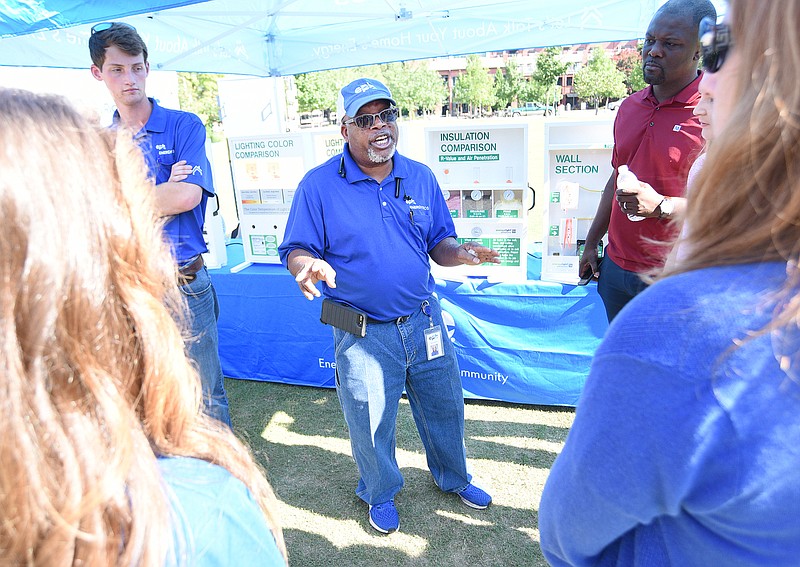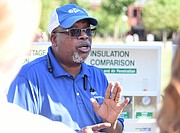Until a couple of years ago, Ezra Harris typically paid more than $120 a month for his electricity with some monthly EPB bills jumping to as much as $320 a month to heat his Woodmore home.
"It was a real hardship some months," Harris recalled.
But in 2020, Harris signed up for the Home Uplift program to install a more energy-efficient heating and cooling system, a new water heater, and even a smoke detector and carbon monoxide detector. His monthly electric bills have been nearly cut in half and he says he enjoys the temperature year-round in his entire house.
"It has really saved me money and helped me a lot because the money I save on the front end can make a real difference in helping out in the long run on the back end," Harris said Thursday during an event at Miller Park celebrating EPB's energy improvement program.
Now, Harris says he pays just $64 a month for electricity, even during the hot weather this summer when hotter temperatures and higher electricity prices pushed up power bills for most other households.
"This is a great program that I think should go nationwide because it is so helpful for everyone to be more energy efficient," he said.
Harris is among 600 low- and moderate-income homeowners who have benefited during the last seven years from EPB's Home Uplift program, which provides home energy upgrades to improve energy efficiency and cut the monthly utility bills for consumers.
Since EPB's pilot program was taken across TVA's seven-state region four years ago, 3,386 homes have received energy upgrades. For a typical investment of about $10,000 in home insulation, window weatherization and more energy-efficient appliance, furnaces and air conditioners, the average home has cut electricity use by about 25%, TVA officials said Thursday.
"We take homes that are often very energy inefficient and the owners don't have the resources to upgrade their energy systems themselves," EPB President David Wade said during Thursday's event at Miller Park. "The energy retrofits that we're able to do provide a tremendous amount of energy savings, helping these customers to save hundreds or in some instances even thousands of dollars."
The energy improvements EPB has made over the past seven years also translate into 1,800 metric tons of avoided greenhouse gas emissions, or an amount equal to burning 1.9 million pounds of coal or more than 4,000 barrels of oil.
"By lowering energy bills for some of our most vulnerable residents, Home Uplift is helping people stay in their homes while also improving their health and reducing our greenhouse gas emissions," Chattanooga Mayor Tim Kelly said in a statement Thursday.
The Tennessee Valley Authority matches funds for the energy improvement programs provided by local power utilities, the state Department of Environment and Conservation, and other local community groups and individual donors. In Chattanooga, the Home Uplift program has funded more than $7.4 million in home energy upgrades since the program began as a pilot project in 2015.
Across the Tennessee Valley, TVA has invested more than $21.68 million in the program, which has been matched with comparable contributions from 53 local power companies and other nonprofit, church and individual donors.
In the next year, EPB has pledged to match TVA's contribution, providing another $1 million for Home Uplift in the next year to pay for about 100 more energy upgrades at local homes.
"I hope we can do even more," Wade said.
Through the Home Uplift partnership, the EPB's Energy Pros provided Joyce Threat with a new heating and cooling system to replace her propane furnace along with complete insulation and air sealing throughout her home. Threat said the energy upgrades saved her thousands of dollars when the price of propane spiked last winter.
"I got my Home Uplift just in time," Threat said in a statement released Thursday. "I'm very happy with the job they did and the service they gave me. My daughter has asthma, and she doesn't cough anymore when she visits me."
Cindy Herron, TVA's vice president for the EnergyRight program, said recipients of the program "repeatedly tell me they feel safer and more comfortable in their homes and they can often live much better lives."
In an interview Thursday, TVA Chairman Bill Kilbride said the program "is the right thing to do" even if it reduces sales for TVA.
"I wish there were 6,000, not just 600, that could be served here," he said.
As public power utilities, TVA and EPB exist to serve their customers, not private shareholders.
Nonetheless, environmental groups such as the Southern Alliance for Clean Energy have criticized TVA for not doing as much as it once did to incentivize all of its customers to make energy efficiency improvements to cut their consumption and bills.
Residents in the Tennessee Valley tend to have a higher energy burden than most of the country, as measured by the share of their income spent on paying their monthly electric bills. Residential power rates for TVA are below 80% of U.S. utilities and industrial rates are lower than 95% of all U.S. utilities, but per capita consumption tends to be higher due to less efficient buildings and homes and a higher share of households heating and cooling their homes with electricity in the Tennessee Valley.
A study by the Southern Alliance for Clean Energy earlier this year said the typical residential household in the Tennessee Valley uses 25% more electricity than the country as a whole, ranking Tennessee as the second highest state for per capita electricity use. The environmental group said TVA spending on energy efficiency as a share of power sales is less than 10% of the U.S. average.
TVA officials have said in the past they have targeted their energy efficiency programs to low-income users because that is where the greatest advantages can be realized. More affluent residents and business customers should be able to tap into tax credits and use the energy savings from their efficiency investments to pay for such upgrades, officials said.
To qualify for the Home Uplift program, household income must be no more than 200% of the federal poverty rate, which in most of Tennessee allows a couple to participate if their total income is below $36,620 or a family of four if their annual income is below $55,500. Herron said about 30% of all homes in the Tennessee Valley qualify for the program.
Eligible Home Uplift participants may receive duct replacement, water heater and pipe insulation, wall insulation, HVAC clean and tune, windows and door replacement, and replacing heat pumps, water heaters and refrigerators. On average, EPB's Home Uplift participants save more than $400 on their energy costs each year.
EPB Energy Pros can also provide guidance to help any EPB customer plan solar installations, install electric vehicle chargers or make home energy renovations. Customers can call our EPB Energy Pros at 423-648-1372 or book a free appointment at EPB.com/energypros.
Contact Dave Flessner at dflessner@timesfreepress.com or at 423-757-6340. Follow on Twitter at @Dflessner1

